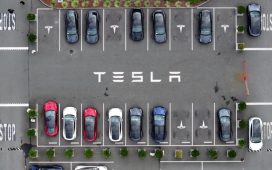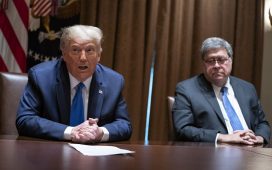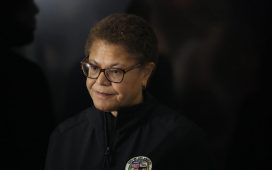A former factory worker at Tesla Inc. who alleges racism was rampant on the assembly line already has achieved a rare feat: forcing the electric-car maker to fight him in open court.
But when Owen Diaz takes his case to a jury trial starting Friday in San Francisco, he’s up against a company that almost never loses workplace disputes.
Of almost 90 employment-related arbitration complaints filed against Tesla from 2016 to March of this year, the company prevailed in 11 cases decided by a private judge after closed-door hearings, according to data compiled by JAMS, the arbitration service provider that handles the company’s disputes. Tesla lost only one arbitration — a case very similar to Diaz’s that ended in May with a $1 million award to the ex-employee. Most other cases settled or were abandoned, withdrawn or dismissed without a hearing.
Diaz was exempt from the company’s mandatory arbitration policy and able to pursue his case in federal court because he came to Tesla as a contractor through a staffing agency. The trial will pit Diaz’s allegations that he was repeatedly called the “N-word” and other epithets against Tesla’s defense that it never intended to embarrass and hurt him or disregard the rights and safety of African-American workers placed by the staffing agency. Tesla didn’t respond to a request for comment ahead of the trial.
Several days of witness testimony from fellow workers, supervisors and human resources personnel will cast a spotlight on years of complaints from Black workers that managers at Tesla’s factory in Fremont, Calif., turned a blind eye to the commonplace use of racial slurs on the assembly line and were slow to clean up graffiti with swastikas and other hate symbols scrawled in common areas. About 10,000 people work at the factory, which Tesla acquired in 2010.
The case may also embolden shareholder activists who have pushed Tesla’s board, so far without success, to adopt more transparency about its use of arbitration to resolve complaints about sexual harassment and racial discrimination. The board is urging investors to vote down such a proposal at a shareholder meeting scheduled for Oct. 7 even as other big Silicon Valley companies, from Alphabet Inc. to Uber Technologies Inc., have backed off the use of mandatory arbitration.
“For Tesla to have to defend itself in the public eye is very important,” said Hilary Hammell, an Oakland, Calif.-based employment-discrimination attorney at Levy Vinick Burrell Hyams LLP. “The fact that arbitration agreements are so common in employment really undercuts the right to a jury trial, especially when it comes it our civil rights.”







